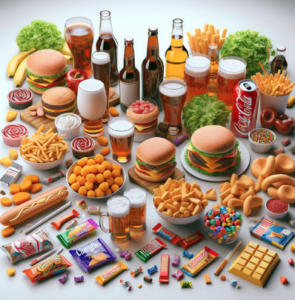In an alarming development, new global research has found that ultraprocessed foods (UPFs) are significantly contributing to rising rates of premature deaths worldwide. A groundbreaking study published in the American Journal of Preventive Medicine in April 2025 has revealed strong links between UPF consumption and preventable mortality across several countries. With modern diets increasingly dominated by processed convenience foods, these findings have ignited urgent calls for change.
It must be recognized that while ultraprocessed foods offer affordability and convenience, their long-term effects on health are becoming more devastating than previously imagined. From disrupting gut health to triggering chronic inflammation, the impacts are widespread and deadly.
Thus, a detailed exploration of ultraprocessed foods, the scientific findings, health implications, global trends, and actionable recommendations will now be provided in the following sections.
What Are Ultraprocessed Foods?
Ultraprocessed foods, often abbreviated as UPFs, refer to industrially manufactured food products made with substances rarely found in a traditional kitchen. These include:
-
Hydrogenated oils
-
Flavor enhancers
-
Artificial sweeteners
-
Emulsifiers
-
Preservatives
-
Colorants
They are specifically designed to be convenient, highly palatable, and shelf-stable, but at the same time, they contain little to no actual whole food.
Common examples of ultraprocessed foods:
-
Soda, energy drinks, and sweetened juices
-
Packaged snacks like chips, cookies, and crackers
-
Instant noodles and soups
-
Frozen ready-to-eat meals
-
Processed meats such as hot dogs, sausages, and deli meats
-
Sweetened breakfast cereals
-
Mass-produced baked goods
Because of aggressive marketing, affordability, and accessibility, ultraprocessed foods have infiltrated daily diets across both developed and developing nations.
The Global Study Linking UPFs to Premature Deaths
A multi-country study involving data from the United States, United Kingdom, Canada, Brazil, Australia, Poland, and Mexico provided stark evidence of the health hazards posed by UPFs. Over 240,000 adults aged 30 to 69 were tracked over several years to analyze their dietary patterns and health outcomes.
Key findings from the study included:
-
Every 10% increase in caloric intake from UPFs resulted in a 2.7% to 3% higher risk of premature death.
-
In the U.S., an estimated 124,000 early deaths annually during 2017–2018 were directly linked to UPF consumption.
-
Similar trends were observed in Brazil and Mexico, where dietary shifts toward packaged foods have intensified.
The study meticulously adjusted for lifestyle factors such as smoking, physical inactivity, and socio-economic status. Therefore, the link between ultraprocessed food intake and early mortality appeared as a strong, independent association rather than a coincidental finding.
How Ultraprocessed Foods Harm the Body
Understanding the biological mechanisms behind UPF-related mortality is essential. Ultraprocessed foods inflict damage on the human body through several interconnected pathways:
Nutritional Deficiencies
Despite being calorie-dense, UPFs are typically devoid of essential nutrients, including vitamins, minerals, antioxidants, and fiber. A sustained diet high in UPFs leads to hidden hunger, where caloric needs may be met but critical nutrient requirements are not. This nutritional imbalance weakens the immune system, impairs tissue repair, and slows down essential metabolic functions.
Chronic Inflammation
Many ingredients found in ultraprocessed foods, such as artificial emulsifiers and preservatives, can disrupt the gut microbiome. A disturbed gut environment fosters chronic systemic inflammation, a condition known to precede major diseases including:
-
Type 2 diabetes
-
Cardiovascular disease
-
Various cancers
-
Autoimmune disorders
Hormonal Dysregulation
Certain additives and chemical residues act as endocrine disruptors, interfering with hormonal signaling. This disruption leads to:
-
Increased fat storage
-
Insulin resistance
-
Fertility issues
-
Mental health disturbances
Consequently, long-term consumption of UPFs sets the stage for numerous chronic conditions, thereby increasing the likelihood of premature death.
Disease-Specific Risks Tied to Ultraprocessed Foods
A more detailed breakdown of specific diseases linked to high UPF intake, according to the 2025 study, is provided below:
-
Circulatory diseases:
UPF consumption has been associated with a 9% higher risk of death from cardiovascular diseases such as heart attacks and strokes. -
Digestive diseases:
Mortality from digestive conditions, including liver cirrhosis and gastrointestinal cancers, was found to be 12% higher among heavy UPF consumers. -
Neurodegenerative diseases:
A staggering 23% increase in deaths from neurodegenerative illnesses, including Parkinson’s disease and dementia, was documented.
It must be emphasized that these statistics are after adjusting for traditional risk factors, firmly establishing UPFs as a significant contributor to these deadly conditions.
Why Ultraprocessed Foods Are Addictive
A growing body of research now recognizes that UPFs are not just unhealthy—they are also designed to be addictive. The food industry meticulously formulates products with precise combinations of:
-
Sugar
-
Salt
-
Fat
-
Artificial flavors
These combinations hyper-stimulate the brain’s reward systems, releasing dopamine at levels similar to addictive drugs like nicotine and alcohol.
As a result, individuals often experience:
-
Cravings for more UPFs even when full
-
Loss of control over eating behavior
-
Heightened pleasure responses to processed foods compared to natural foods
Consequently, repeated consumption of ultraprocessed foods creates a biological dependency that perpetuates poor dietary habits and health outcomes.
Global Trends in Ultraprocessed Food Consumption
The extent to which UPFs have infiltrated global diets is concerning:
-
United States:
Over 60% of daily calories consumed by Americans now come from ultraprocessed foods. -
United Kingdom:
Approximately 56% of the British diet is made up of UPFs. -
Brazil and Mexico:
Rapid dietary transitions have been documented, with UPF consumption steadily climbing over the past decade.
Additionally, UPFs are disproportionately consumed by low-income communities and younger populations, exacerbating health inequalities and potentially dooming future generations to shorter life expectancies.
The spread of ultraprocessed foods has been fueled by aggressive marketing campaigns, the global expansion of fast-food chains, and the prioritization of convenience in busy lifestyles.
Government Actions and Policy Responses
Recognizing the mounting evidence, several governments have initiated policy responses aimed at reducing UPF consumption:
-
Brazil:
Official dietary guidelines now explicitly advise avoiding ultraprocessed foods entirely. -
Mexico:
A front-of-package warning label system highlights products high in sugars, fats, or sodium. -
Chile:
Strict regulations prevent UPFs from being advertised to children, including cartoon characters on packaging. -
Canada:
A proposed sugar tax on processed foods aims to discourage excessive consumption.
However, challenges persist. The powerful food industry lobbies heavily against stricter regulations, often delaying or watering down legislative efforts. Therefore, while government action is critical, public awareness and grassroots movements also play an essential role.
What Individuals Can Do: Practical Strategies
Despite the scale of the problem, individuals can still take meaningful steps to protect their health:
Prioritize Whole and Minimally Processed Foods
Choosing foods in their natural or minimally altered state ensures a better nutrient profile. Examples include:
-
Fresh fruits and vegetables
-
Whole grains
-
Legumes
-
Nuts and seeds
-
Fresh fish and lean meats
Read Food Labels Carefully
Ingredients lists should be short and composed of recognizable items. Long lists filled with chemical-sounding names are a red flag for ultraprocessed content.
Cook More Meals at Home
Home cooking provides complete control over ingredient quality, portion sizes, and preparation methods. Batch cooking and meal prepping can make this more manageable, even for those with busy schedules.
Be Skeptical of Health Claims
Products labeled “low-fat,” “organic,” or “natural” are not always healthy. Many UPFs use misleading marketing to appear healthier than they are.
The Future: Redefining Food Culture
A seismic cultural shift toward real, unprocessed food is needed to reverse current trends. Education campaigns, school meal reform, improved food environments, and better food system regulation will be key pillars in changing global eating habits.
Already, there is growing momentum behind movements promoting:
-
Plant-based diets
-
Local food systems
-
Community gardening
-
Culinary education
Ultimately, reclaiming control over food choices will not only save lives but also foster stronger communities and a healthier planet.
The new evidence linking ultraprocessed foods to rising premature deaths worldwide cannot be ignored. Although these foods provide convenience and affordability, their hidden costs in terms of human health are staggering. Governments, communities, and individuals must act swiftly to stem the tide of UPF-driven mortality.
By embracing whole foods, demanding better policies, and resisting the addictive lure of ultraprocessed products, society has the opportunity to avert millions of preventable deaths in the coming decades. The journey may be challenging, but the stakes could not be higher.
Feel free to check out our other website at :aibrainpowered.com











